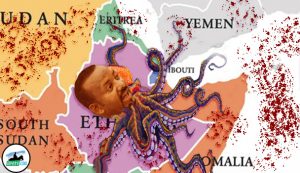It was always clear that Ethiopia’s false historical narrative would one day catch up with it. The country that was Abyssinia adopted Africa’s historical Greek name, Ethiopia, in 1932. It currently proves every sunrise and every sunset that it cannot hold the many nations it had held together by force in the past. The war with Tigray, the current ongoing Amhara war, the much older but currently sleeping Somali war, and the many other nationalities that are stirring and seeking freedom from oppression are all indications that things are no longer at ease or that things are falling apart, to use the phrases of Chinua Achebe, Nigeria’s great author and literary man.
The center can no longer hold as fires flare up in almost every corner of the country. The Afar/Somali wars, the Benishangul uprising, the conflicts pitting the Amhara against the Tigrayans and vice versa, the involvement of Eritrean forces in West Ethiopia, and the latest misstep of Ethiopia’s leader to sign an MoU with one of the regions of Somalia in an attempt to export the internal conflicts to neighboring countries are all signs that Ethiopia needs to pause and take a deep breath. What has happened to the great nation that previous regimes maintained was forged out of internally generated ancient historical development?
Some call the misstep of the MoU an audacious move on the part of Ethiopia’s current leadership, but, indeed, one can only describe it as an ill-thought-out, undiplomatic, and reckless action that has put the ancient empire at risk. It has, indeed, aligned itself, almost childishly, with forces that probably wanted to see the end of Ethiopia and its breakup into its constituent nation states that were held together by force in the past. Note that the country consists of 80 nations, some of which are large enough to stand alone as states, such as the Somali State, the Sidama State, the Oromia State, the Amhara State, the Tigray State, the Afar State, and many others.
Emperor Haile Selassie would probably have come out of the grave forcefully should he have been informed of what is happening to the nation he forged through many means and ways—both legal and illegal—through diplomacy and skills that many Africans have failed to achieve to this date.
Somalia’s claims on Ethiopia’s current territory, the Somali State of Ethiopia, which included parts of the current Oromia State, were refuted by the international community and the African continent. What makes the current Ethiopian regime believe that it can get away with the illegal MoU that challenges all established norms of territorial integrity and sovereignty among countries? How does the Ethiopian regime, which is unable to hold its nations together and is involved in the absolutely uncalled for killing process of its own populations—the Amhara, the Tigrayan, the Benishangul, the Afar, the Somali, and many others—be so myopic as not to note that this can only lead to further disruption of life in the Horn of Africa States region?
The flagrant interference in the affairs of neighbors can only lead to further turmoil in the region and, indeed, challenges the very essence of the Somali people, who are not known to shy away from protecting their rights, lands, seas, and, indeed, lives. The undiplomatic faux pas of the current Ethiopian regime with respect to the MoU only exasperates the ongoing civil conflicts in Ethiopia and does not add one iota of advantage for Ethiopia. A much better defense of Ethiopia would have been the befriending and collaboration with Somalia, which traditionally was the source of most troubles for the country. It is where Ethiopian diplomacy should have been directed.
It only came to Somalia to announce recently that Ethiopian forces, which are part of Africa’s ATMIS mission in Somalia, would not be allowed to remain in the country by the end of this year. Instead of listening to the drift, Ethiopia seems to be ignoring the wishes of the Somali people and has recently poured more forces into the country. This appears to be aimed at recreating the old Ethio-Somali antagonisms, which were nearly forgotten by the populations.
This is not in the interest of the region, and the Ethiopian regime’s brinkmanship appears to be only exasperating the region’s already beleaguered political instability and weaknesses and opening more spaces for foreigners to interfere in the region. The Ethiopian regime seems to be slavishly following the wrong guidance of mauvais conseillers, which would only lead to more chaos in Ethiopia and the region.
The future of the region and its fragile peace need to be supported through dialogue, discussions, and cooperation, not only within the realm of each state but also collectively as a region. The old nation-state format of the region only led to misery and more chaos, and it is perhaps high time the region’s leadership moved away from those unnecessary and risky processes that only led to more internal and regional upheavals.
The grave miscalculations of the current Ethiopian regime with respect to Somalia would have terrible consequences for the region, which many enemies of the region would love to see happen or realized. The Ethiopian regime should refrain from the wrong trail it has embarked on and take a step back from the ill-thought-out steps it has so far taken, which have put the region on the edge of a steep precipice. A regional dialogue would probably slow down the downward slip that Ethiopia’s moves have caused. It is the only way to a peaceful coexistence in the region and a better hope for its populations.











 Source:Awate.Com
Source:Awate.Com





